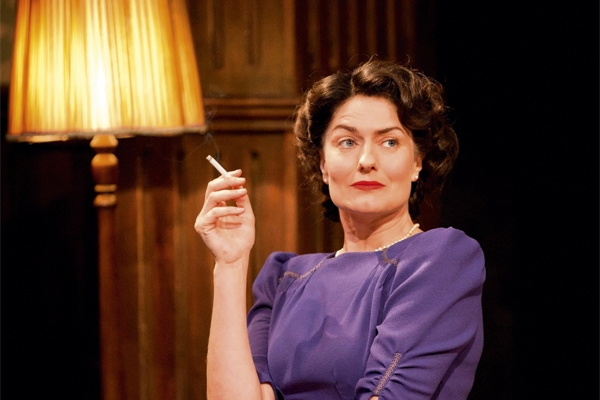What’s going on? Everyone’s doing playlets all of a sudden. I saw five this week. The Donmar is presenting a trio of scripts by Robert Holman entitled Making Noise Quietly. A silly title. ‘A writers’ writer’ — an even sillier cliché — is how the programme notes describe Holman. If they mean ‘a boring writer’ they should say so. His first play shows us two teenage pacifists meeting in the countryside during the closing months of the war. One is openly gay, the other is still hunting for the closet door. They chat. They flirt rather innocently. Then they strip off and sunbathe. That’s all that happens.
Plays like this, static and plotless, take enormous risks with the audience’s patience. To engage the crowd with earnest, high-minded chitchat is quite a challenge but this play succeeds because the lads’ conversation throbs and hums with internal tensions as they explore each other’s emotional background. Matthew Tennyson is charming, and extremely funny, as the camper of the two queens. He recalls being seduced at Repton by a prefect. ‘I was toasting his muffin when the request came.’ Lines like that shimmer with suggestive comedy. A great opening.
The next play is equally immobile and chat-laden. A posh naval officer visits a Geordie mum to inform her that her estranged son has died at sea. There’s a plot twist here. The officer turns out to be a closer relative of the mum than was first apparent. Holman’s subtle and oblique dialogue casts a magical spell as the dead sailor’s secret life emerges in the airless quiet of a suburban sitting room. However, the dead man is the most interesting character and his absence seems to be an artistic problem. Then again, that may be Holman’s artistic point.
The final play is too ambitious and contrived. A violent British squaddie is cured of his uncontrollable temper by a wise Jewess who survived the holocaust. The drama is complicated by the presence of an eight-year-old boy, whom the squaddie bullies, and who has never spoken in his life. Sure enough, the beaming old crone coaxes him from his silent prison. And, lo, the mute mite speaks! It’s all too predictable. The three plays are finely acted and Peter Gill’s staging is done with understated elegance. It’s a slender wisp of an evening. And the best comes earliest.
A double bill at the Pinter theatre opens with David Hare’s latest play, which is set in his old school Lancing, in 1962. It features a foreseeable mix of weak-minded bullies, solid chaps and oversensitive violets. Some scenes are hilarious. Andrew Woodall has fun as a sadistic English master who intimidates the boys by teaching them Pope — ‘true wit is nature to advantage dressed’ — in a sarcastic and bullying manner. The irony is wonderful. And Hare brilliantly captures a particular moment in history. In 1962 the British left was touched by messianic optimism. When they talked of Harold Wilson as a saviour who could heal the world with technology they were being perfectly sincere. (Wilson’s government lost no time dissolving the illusion.)
And Hare is superb at depicting teenagers. They sound like real public school boys, cocky, sagacious, fickle and cruel. And they have that confusion which doesn’t feel like confusion to the confused, but absolute certainty. They’re pretentious too, and deliciously rude about each other’s pretentions. ‘A couple of chaps had to vomit in the quad when you mentioned Sartre.’ The play’s only failing is its want of ambition. Hare rustled it up, at the bidding of the Rattigan estate, as a curtain-raiser to The Browning Version. It deserves to go back to the kitchen with a memo to chef: create something meatier, and weightier, than this wispy amuse-bouche.
The play it politely introduces is one of the gems of the repertoire. The Browning Version introduces us to Crocker-Harris, a dusty old classics master, preparing to leave the school he has faithfully served for 18 years. The ‘Crock’ proposes to entertain the assembled boys with a pun connecting ‘vale’ (‘farewell’ in Latin) with ‘Wally’, the name of a boy in his class. What a hoot. One of the play’s many miracles is that this awful, dried-up pedant becomes a figure of tragic stature. Nicholas Farrell, with his grey hair combed ruthlessly flat, gets the Crock’s punctilious correctness perfectly. And Anna Chancellor skilfully traces the terrible descent of his wife. She starts as a sophisticated and debonair beauty but within an hour she’s been exposed as a snobbish, shallow arch-deceiver.
Every note of this production, by Angus Jackson, meets the demands of Rattigan’s script. If a better one-act play exists, I’ve never seen it. Some have called this the finest piece of dramatic portraiture ever created. I know what they mean.







Comments